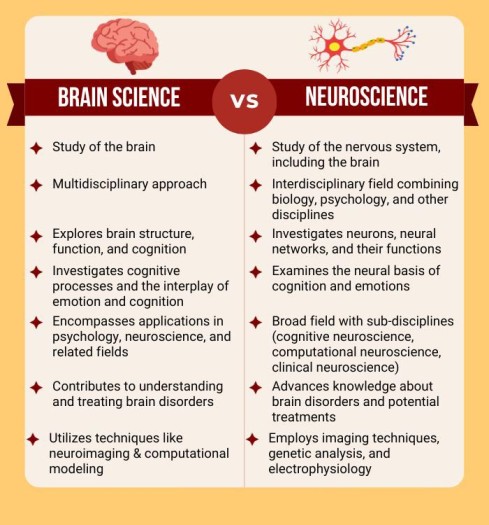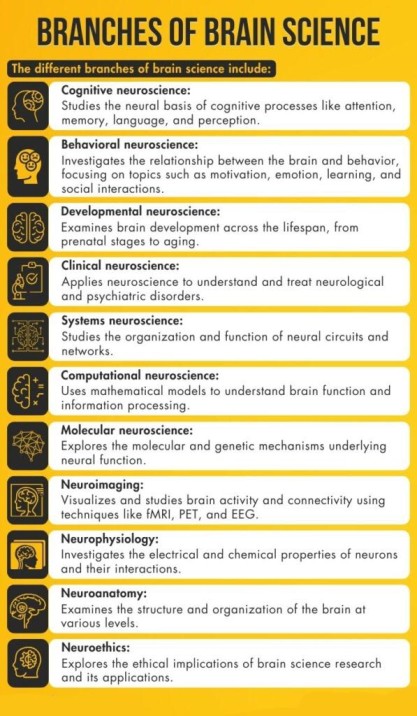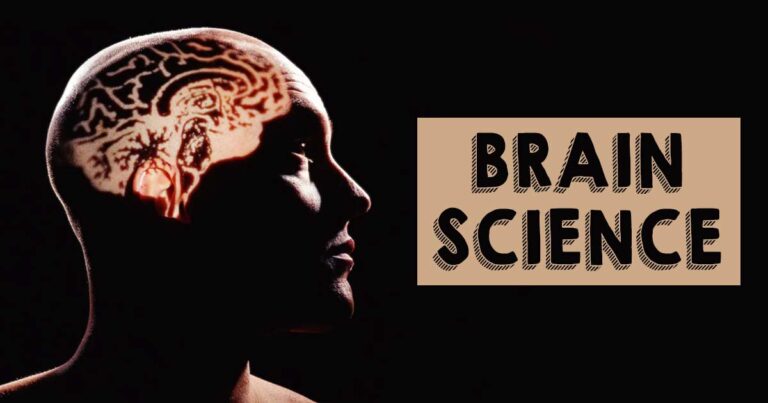The human brain has long been regarded as one of life’s greatest mysteries. Brain science, also known as neuroscience, is a multidisciplinary field that explores the scientific study of the brain.
What Is Brain Science?
Brain science, also known as cognitive science or neuroscience, is the interdisciplinary study of the brain and its functions, with a particular focus 1 Brenner, S., & Sejnowski, T. J. (2011). Understanding the human brain. Science (New York, N.Y.), 334(6056), 567. https://doi.org/10.1126/science.1215674 on understanding how the brain processes information, generates thoughts and emotions, and controls behavior. It combines knowledge from various fields such as biology, psychology, computer science, and philosophy to unravel the mysteries of the brain’s structure and function.
In the realm of psychology, brain science provides a foundation for understanding the biological basis of human behavior and mental processes 2 Spenrath, M. A., Clarke, M. E., & Kutcher, S. (2011). The science of brain and biological development: implications for mental health research, practice and policy. Journal of the Canadian Academy of Child and Adolescent Psychiatry = Journal de l’Academie canadienne de psychiatrie de l’enfant et de l’adolescent, 20(4), 298–304. . It investigates how the brain and nervous system influence cognitive processes, perception, memory, learning, decision-making, and emotional responses.
By examining neural pathways, brain imaging techniques, and neurotransmitter systems, researchers can gain insights into the underlying mechanisms of mental disorders and psychological phenomena. This knowledge can inform the development of therapeutic interventions and treatments for conditions such as depression, anxiety disorders, addiction, and neurodegenerative diseases.
Functions Of Brain Science
The chief functions 3 Database, I. of M. (US) C. on a N. N. C., Pechura, C. M., & Martin, J. B. (1991). Summary. In www.ncbi.nlm.nih.gov. National Academies Press (US). Available from: https://www.ncbi.nlm.nih.gov/books/NBK234380/ of brain science include:
- Understanding brain structure and organization.
- Investigating brain development and plasticity.
- Studying neural mechanisms of cognition, perception, memory, and emotions.
- Exploring the brain-behavior relationship.
- Investigating effects of drugs and substances on the brain.
- Unraveling neural basis of psychological disorders.
- Developing innovative treatments and interventions.
- Applying brain imaging techniques.
- Modeling and simulating brain activity.
- Studying genetics and environment on brain function.
- Advancing AI through understanding brain processes.
- Informing education and learning strategies.
- Exploring consciousness and subjective experiences.
- Developing neurotechnologies and brain-computer interfaces.
- Informing public policy and ethical discussions.
Read More About Memory Here

The Brain And Cognitive Sciences
Cognitive psychology and brain science are closely related disciplines 4 Cognitive Science. (2004, April 6). Www.ncbi.nlm.nih.gov; National Library of Medicine (US). Available from: https://www.ncbi.nlm.nih.gov/books/NBK518721/ that study the mind and its biological basis. Cognitive psychology focuses on understanding mental processes through behavior and cognitive representations, while brain science investigates the brain’s structure, function, and mechanisms.
They complement each other by integrating brain findings with cognitive theories and models, providing a comprehensive understanding of the relationship between brain activity and cognition. Cognitive psychology informs brain science’s hypotheses and experimental design, while brain science provides empirical evidence to validate and refine cognitive theories. Together, they advance our understanding of the interplay between the brain and cognition.
Brain Science And Mental Health
Brain science has significant implications 5 Washington, N., Leone, C., & Niemi, L. (2022). 5 Neuroscience and Mental Illness (F. De Brigard & W. Sinnott-Armstrong, Eds.). PubMed; MIT Press. Available from: https://www.ncbi.nlm.nih.gov/books/NBK583721/ for mental health. It allows for a deeper understanding of the biological and neurological factors contributing to mental illnesses, helping to reduce the stigma associated with psychological disorders.
Through advancements in brain imaging technologies and studies on brain plasticity, researchers can explore how the brain adapts and changes in response to experiences and interventions, offering potential avenues for improving mental well-being.
Additionally, the insights gained from brain science can aid in the development of targeted interventions, personalized therapies, and preventive measures for mental health conditions, ultimately leading to improved diagnosis, treatment, and overall quality of life for individuals affected by mental health issues.

Application Of Brain Science In Daily Mental Health Functioning
The common applications 6 Sloman, S. A., Patterson, R., & Barbey, A. K. (2021). Cognitive Neuroscience Meets the Community of Knowledge. Frontiers in systems neuroscience, 15, 675127. https://doi.org/10.3389/fnsys.2021.675127 of brain science in our everyday mental health functioning include:
1. Understanding Brain-based Disorders:
Brain science informs the diagnosis, treatment, and management of mental health disorders.
2. Developing Effective Interventions:
Brain science helps develop targeted therapies for specific cognitive and emotional challenges.
3. Informing Psychotherapy Approaches:
Incorporating brain science techniques enhances psychotherapy effectiveness.
Read More About Psychotherapy Here
4. Promoting Neuroplasticity And Resilience:
Brain science guides strategies for resilience and optimizing mental health.
5. Tailoring Medication Treatments:
Brain science informs personalized medication treatments for mental health conditions.
6. Enhancing Cognitive Performance:
Brain science strategies improve attention, memory, problem-solving, and creativity.
7. Educating Individuals About Their Brain:
Brain science education reduces stigma and fosters self-compassion.
8. Personalizing Mental Health Care:
Brain science allows tailored treatment plans based on individual brain profiles.
9. Early Intervention And Prevention:
Brain science aids in early identification and intervention for at-risk individuals.
10. Informing Public Policy And Advocacy:
Brain science shapes mental health policies and access to effective treatments.
Takeaway
The realm of brain science is a dynamic and interdisciplinary field, delving into the intricate workings of the human brain and its multifaceted functions. Its significance is paramount in propelling mental health research and enhancing care, offering invaluable perspectives on psychological disorders, and enabling tailored therapeutic approaches.
Beyond healthcare, brain science finds application in diverse domains, spanning education, artificial intelligence, neurotechnology, and public policy, thereby leaving an indelible mark on human welfare and deepening our comprehension of cognition and consciousness.
At A Glance
- Brain science seeks to unravel the mysteries of the brain and understand its intricate workings.
- It delves into how the brain learns, understands, perceives, acquires, remembers, and generates language.
- Brain science investigates the relationship between emotions and cognitive processes, shedding light on how they interact and influence each other.
- The human brain has the remarkable ability to adapt and develop throughout life, and brain science helps us understand how it changes as we learn new things.
- Brain science and mental health research often aid each other in mental health care treatment.
- Cognitive and brain sciences are highly sought-after fields in psychology.
- Brain and cognitive sciences offer versatility in their applications and address key aspects of human cognition and behavior.
Frequently Asked Questions (FAQs)
1. Is brain science the same as neuroscience?
Yes, brain science and neuroscience are generally considered to be the same field, focused on studying the structure, function, and behavior of the brain and nervous system.
2. What is brain science called?
Brain science is also known as neurobiology or neurosciences.
3. Why do we need to brain science?
We need brain science to better understand how the brain works, its role in human cognition, behavior, and mental health, and to develop treatments and interventions for neurological and psychiatric disorders.















